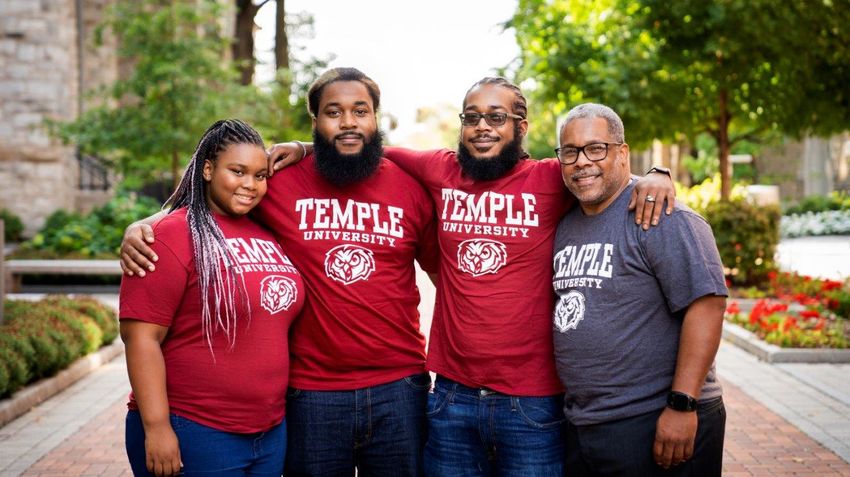
Over the course of his career, Lovell Harmon has helped health insurers like Aetna, Independence Blue Cross, United Healthcare and others connect with underserved communities. He has worked to make sure that those in need get what they need, while those in business can keep their business.
There was the time he was consulting with an insurer that was concerned about a woman who was repeatedly getting admitted to the hospital for diabetic shock, spending days at a time in a hospital bed. The company’s concern was the cost. They suggested she was abusing the system.
“Nobody that I know goes into diabetic shock to get a free inpatient stay in the hospital,” says Harmon, a member of the College of Public Health’s Board of Visitors. The woman’s doctor confirmed that she was filling her insulin prescription. Harmon decided to explore the situation. He asked one of the community groups he had partnered with to do a home visit, and they discovered that the woman didn’t have a refrigerator—the medicine she stored at home was losing its effectiveness.
“So now I have a $600 fix for a ten thousand dollar problem,” Harmon says. The community group was able to donate a refrigerator to the woman to keep her out of the hospital.
“I had a mentor who told me: Never lose the ability to go from the boardroom to the kitchen table,” Harmon says. He says his education at Temple—a bachelor of business administration (‘88), a master of business administration in health administration (‘97), and a master of science in healthcare financial management (‘97)—prepared him to do it.
“I always tell people if you come out of Temple University, it doesn't just prepare you to work. It prepares you to make the machine go,” he says.
Harmon was born and raised in Philadelphia. His parents had been civil rights activists, and he remembers visiting the Temple campus, in awe, as a young child. After he finished as class valedictorian in high school, he turned down Stanford and Penn State to attend Temple. It was close to his family and a job he had, and it offered everything he wanted.
“I had grown up in a school that was primarily African American, and I wanted to be in a diverse setting,” he recalls. “And I grew up poor. I needed to be in an environment with people from all different economic walks of life.”
He liked the variety the university had to offer. After flirting with architecture, he tried an economics course, loved it, and switched to business. He persevered through family tragedies that robbed him of his parents and older sister, and he assumed the role of foster parent to his seven younger siblings.
“I decided to stay in school. I said, I'm gonna put my head down and power through this. I felt like that is one of the things that Temple University taught me: perseverance,” he says. He often worked three jobs at a time to stay in school.
After graduating, Harmon became an underwriter at Prudential, then moved to US Healthcare and Independence Blue Cross, while doing volunteer work at community organizations in the city. His success prompted him to return to Temple for a dual graduate degree program.
In one health statistics class, he says, a professor changed his mindset forever.
“He said, ‘we're here to learn about public health.’ He talked about how public health was an integral part of social change, social development, and making our society better. It blew my mind,” Harmon recalls.
It had such an impact that he left the corporate world and took his degrees to work for community-development nonprofits in the city. He raised money, did workforce development, and worked in social services, prisoner recidivism, and drug and alcohol rehab. “It was the hardest work I've ever, ever, ever, ever done,” he says.
When he returned to the corporate world, it was about helping insurance companies understand communities, devising Medicare and Medicaid plans, and running foundations. He became senior vice president of business development at a nonprofit HMO offering affordable insurance plans.
Today, he has his own insurance agency serving low-income customers, as well as a consulting firm where he works with healthcare companies that want to improve their community involvement. He asks them: “Are you just taking the money and paying the claims? Are you really engaged with your population to improve their healthcare status? There is a way to do that and still make a strong return on investment.”
Harmon’s experience intertwining the corporate world, fundraising, academia, and public service made his decision to join the CPH Board of Visitors an easy one. “It’s all connected to public health,” he says. He chairs the board’s foundation and corporate engagement committee.
Harmon sent two of his children to Temple. One earned a degree in computer engineering, and the other, who graduated from the Fox School, helped Harmon start his current company. His daughter who is a high school junior sees herself as Temple bound in the College of Engineering. He treasures the network of Temple graduates he encounters throughout his work, and he goes out of his way to help them with job placements, referrals, and advice.
“I use this term all the time: we should be able to lean on the T,” he says. “There's so many of us, all over the place. We should be able to use each other as a resource. We should cultivate that.”
